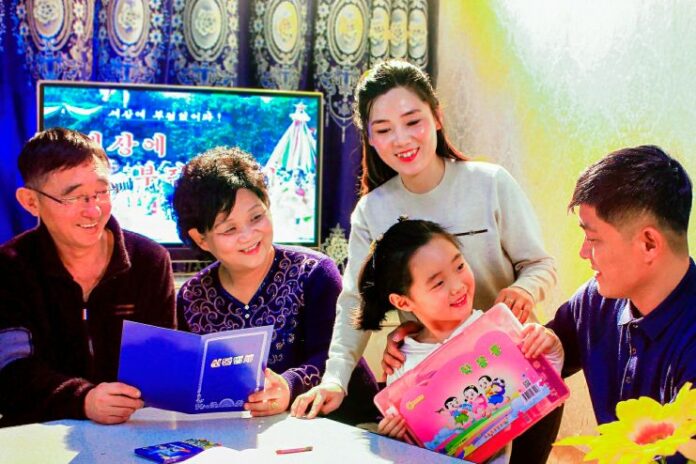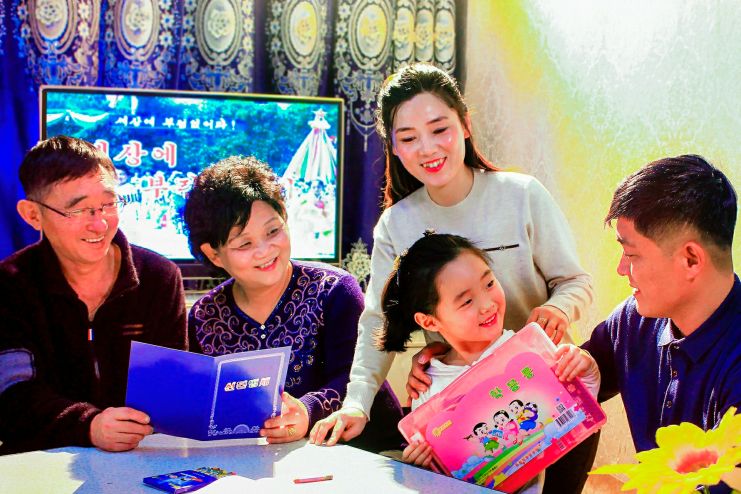 “North Korean leader Kim Jong Un sent heartfelt gifts to children at revolutionary academies, elementary schools, nursery schools, childcare centers, and to nursery school children, preschool school students, and students at day care centers and kindergartens across the country on the occasion of the Kwangmyong Festival,” Rodong Sinmun reported on on Feb. 17, 2024. The gifts included “sunflower” school supplies and foodstuffs, the newspaper said. (Rodong Sinmun-News1)
“North Korean leader Kim Jong Un sent heartfelt gifts to children at revolutionary academies, elementary schools, nursery schools, childcare centers, and to nursery school children, preschool school students, and students at day care centers and kindergartens across the country on the occasion of the Kwangmyong Festival,” Rodong Sinmun reported on on Feb. 17, 2024. The gifts included “sunflower” school supplies and foodstuffs, the newspaper said. (Rodong Sinmun-News1)North Korea’s Central Committee has ordered provincial party committees to pay special attention to families with multiple children, dispatching “visitation teams” to homes to verify compliance with pro-natalist policies and renew family certificates that previously required parents to visit government offices themselves.
“After receiving a party order to look after families with multiple children, the party committee of North Hamgyong province told all local cities and counties that officials mustn’t simply sit at their desks all day looking at incoming documents but get in the field personally, emphasizing the idea that ‘officials are the public’s errand boys, bringing benefits to the people,’” a Daily NK source in North Hamgyong province said recently.
While issuing the order, the Central Committee instructed that people’s committees nationwide submit reports on how they had cared for families with multiple children in the first half of the year.
It also ordered them to intensively investigate whether measures to reduce the work hours of women raising two or more children under the age of eight and to double their regular vacation days were being properly implemented, and to report the results.
Additionally, the people’s committees were ordered to inspect whether women with two or more children were truly being allowed to take optional vacations after giving birth, per party policy.
Door-to-door teams check certificates and living conditions
When the party committee of North Hamgyong province relayed the Central Committee order to city and county authorities and urged officials to get out in the field, the people’s committee of Chongjin ordered the formation of “visitation teams for multi-children households” in each city district.
The teams comprise administrative and public health officials from the district people’s committee, as well as officials from the Socialist Women’s Union of Korea. They have visited an average of five families a day since the middle of last month to determine how they live.
In particular, the teams examine whether every multi-child family has a “multi-child family certificate” and whether the certificates—which have to be renewed every year—have expired.
“Initially, parents had to personally visit the people’s committee to have multi-child family certificates issued or extended, but this time, people’s committee officials are personally visiting families to conduct the procedures,” the source said.
Officials are taking similar measures in Rason as well.
The Rason party committee reportedly told people’s committee officials that people might be pleasantly surprised by their visits and offer them hospitality in gratitude, but they should accept not even a cup of water and simply do their work.
The propaganda department of Rason’s party committee also promoted state benefits for multi-child families, sending one of its loudspeaker vehicles downtown with the slogan, “The state rewards women who have and raise many children.”
“However, people have been apathetic,” the source said. “People shake their heads and say that although the state says it looks after families with multiple children, it only partially helps them, and that such families continue to suffer in hardship.”
